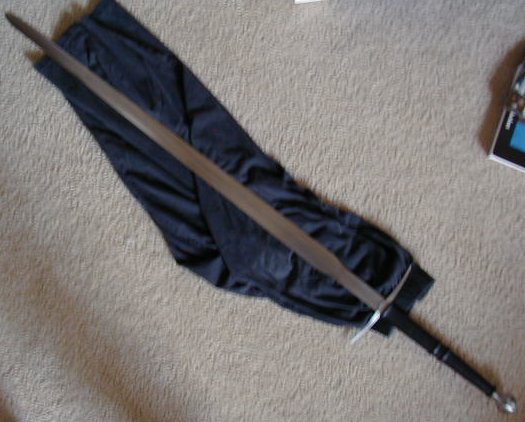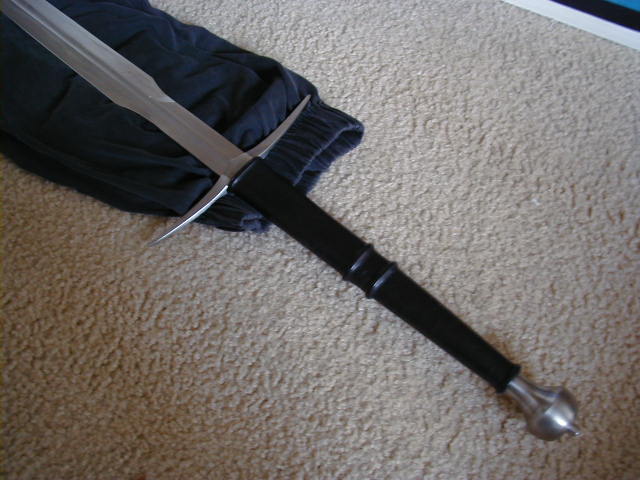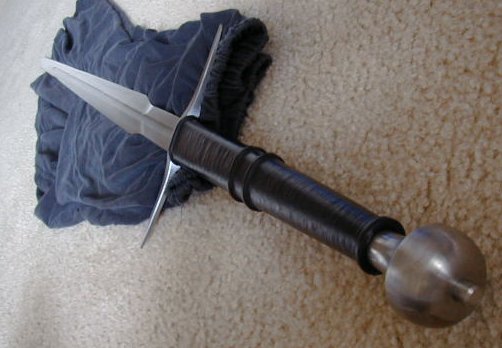I just receiveived the prototype of the AT1592, a huge longsword that AllSaints will soon be carrying. James had said that the fullers were uneven, and so I got it at a nice discount. Although had he never said anything about the fullers, I would have barely noticed. Being the prototype, I don't know if the full production run is going to be the same or not (which is why I'm doing a more informal type of review instead of a full out one).
The sword is an Oakeshott type XVIIIe, a type you don't see so often in the production world. I've always had a soft spot for swords with ricassos, and this one has a nice narrow fuller running along the blade as well, combining two of my favorite aesthetic features on a blade.
I'd handled it's sister sword, the AT1591, when Gus had sent down some blades for the VA cutting party. I instantly fell in love with it, so when I had the opportunity to purchase this one at a discount, I jumped on it. They aren't the same swords, just similar, which was good enough for me. It handles wonderfully. It's a big sword, but is very quick and responsive. There is a very positive blade presence, one that feels ready to make powerful cuts, but at the same time is quick to recover. It flows evenly from guard to guard, and is an excellent thruster. I was joking with some of my students that I could use this thing almost as an effective rapier if it had a complex hilt, and there's even some truth to that.
The grip is a big 11 incher, and the combination of the long blade with the long grip makes this sword lightning fast on the short edge cuts, particularly when performing strikes in the German tradition such as the schielhau, krumphau, and zwerchau. Rotating the blade feels like turning a wheel.
I can't give a weight for it, as my digital scale seems to believe this sword is only 1 1/2 lbs. Gus may be good, but he's not a wizard. I think this sword is over 3 lbs, but guessing the weight of a sword is often times futile due to the balance giving a false impression. But the other stats:
Overall length: 54 1/2"
Blade length (including ricasso): 41 1/2"
Fuller length: 31 1/2"
Ricasso length: 5 1/2"
Grip: 11"
Guard length: 8"
COP: appr 23" from guard
POB: appr 5" from guard
And now some bad pics.
 Attachment: 43.6 KB
Attachment: 43.6 KB

 Attachment: 56.96 KB
Attachment: 56.96 KB

 Attachment: 34.19 KB
Attachment: 34.19 KB




What an elegant 2-hander Bill! Like you I find teh long fuller VERY apealing! The entore shape of the sword looks mean and lean. Is Gus going to be offering this model as a standard line on the All Saints site? I surely hope so. Great going Once again the down-curving cross is gorgeous and the ricasso is very well done.Gus.
Joel
Joel
The way I understand it, yes, it will be a regular model.
| Bill Grandy wrote: |
| The way I understand it, yes, it will be a regular model. |
It is a regular model, the AT1592
Hey Gus,
Very nice job man. I fall more in love with the way the ricasso is done the more I look at it. I love the way the blade comes off the ricasso in that smoothe curve. Very well executed indeed :D Could you tell us more about it? Perhaps about the challenges in making and perfecting it? Love to hear the story behind this puppy.
Joel
Very nice job man. I fall more in love with the way the ricasso is done the more I look at it. I love the way the blade comes off the ricasso in that smoothe curve. Very well executed indeed :D Could you tell us more about it? Perhaps about the challenges in making and perfecting it? Love to hear the story behind this puppy.
Joel
| Angus Trim wrote: | ||
It is a regular model, the AT1592 |
Gus, it looks like you're going to run out of 1500 numbers pretty soon. Of course, you could go back to numbers that you skipped along the way, or were they assigned to prototypes that never made it to production?
| Roger Hooper wrote: | ||||
Gus, it looks like you're going to run out of 1500 numbers pretty soon. Of course, you could go back to numbers that you skipped along the way, or were they assigned to prototypes that never made it to production? |
Hi Roger
Naah, I'm not even close. I have from 1564 to 1590, and several other gaps. I don't expect to run out any time soon. And if I do there's gaps for swords whose blades no longer will fit into my harmonic and dynamic requirements..........
| Joel Whitmore wrote: |
| Hey Gus,
Very nice job man. I fall more in love with the way the ricasso is done the more I look at it. I love the way the blade comes off the ricasso in that smoothe curve. Very well executed indeed :D Could you tell us more about it? Perhaps about the challenges in making and perfecting it? Love to hear the story behind this puppy. Joel |
Hi Joel
It may be that the coffee just hasn't kicked in yet, but I don't understand what your asking.. The ricasso? The transition between blade and ricasso?
I'm not really sure what your asking.........
Gus
| Joel Whitmore wrote: |
| Hey Gus,
Very nice job man. I fall more in love with the way the ricasso is done the more I look at it. I love the way the blade comes off the ricasso in that smoothe curve. Very well executed indeed :D Could you tell us more about it? Perhaps about the challenges in making and perfecting it? Love to hear the story behind this puppy. Joel |
Hi Joel
After a couple cups of coffee, and finishing up a lathe job, I kinda came to the conclusion you were talking about the challenges of designing and making the sword, not the aesthetic stuff. After all, you've been around the forums since before I started........
The challenge lies in harmonics and dynamic balance............
You've heard that one before.
The thing is, what is the sword designed for? That tells you how much mass you need over the length of the blade. Where to put the mass has to do where the ideal and natural locations for the nodes and deminodes on the blade and in the handle should be.........
Other than that, there really wasn't that much challenge. For over a year I was at the 9 inch handle {11 inch hilt}, 38 to 39 inch blade length range. This included blades with and without ricasso {with ricasso, the AT1547.2}, and these shorter blades gave clues to what I would find when I went longer. This included setting the harmonic proportions in lengths and distal taper......... I typically change direction of the distal taper six times while traveling down the spine. The location of these changes is very important in how the finished sword reacts to things like pommel weight..... and believe it or not effects the positon of the deminodes such that even a very well heat treated blade may be prone to bending......
Yep, weird bends that "shouldn't happen" in cutting practice. Even wierd stuff like bending from normal heat treat forces, right out of the quench, or sometimes "post heat treat" a couple of weeks later........
Wierd stuff true, but you can bet that if you hear of a "model" with a strange passion for bending in a certain spot, say 4 inches from the tip, then the problem is likely in the character of the distal taper.......
Some of these lessons were first learned three years ago and more........
I spent over a year in the shorter swords {up to 50 inch lengths} before venturing into the longer swords, longer hilts. With an emphasis on longer hilts. The longer hilts has more to do with dynamic balance than one would believe, and at the same time makes for a more vulnerable sword to abuse........
The AT1591 is where most of the "challenges" were on these longer swords. This one proved my harmonic ideas would work on the longer blades. The most interesting "lesson" or "challenge" on these longer hilted swords is the AT1593 {proportion wise, look at XVIIIa.5 in Records}. A shorter blade, longer hilt than I thought would work proportion wise. But when all finished, all of the deminodes and nodes were where I ideally wanted them..........
Auld Dawg
Thanks again Gus for letting into your mindset. YOu let on some time ago that these 2-handers were on the drawing board so to speak. I think they have turned out beautifully and I have little doubt that they will be awesome performers. How did the 1592 perform in cutting tests? Though long, the blade appears to be very versitile with enough beef for great cuts yet with enough taper to do very well in the thrust. Tell ole' Dawg, how did she perform and what were her unique traits? Damned I am curious aren't I?
Joel
Joel
| Joel Whitmore wrote: |
| Thanks again Gus for letting into your mindset. YOu let on some time ago that these 2-handers were on the drawing board so to speak. I think they have turned out beautifully and I have little doubt that they will be awesome performers. How did the 1592 perform in cutting tests? Though long, the blade appears to be very versitile with enough beef for great cuts yet with enough taper to do very well in the thrust. Tell ole' Dawg, how did she perform and what were her unique traits? Damned I am curious aren't I?
Joel |
Hi Joel
Yeah, the longer stuff has been "on the drawing board" for over a year, actually still working on about 5 of them.
The big key in my design process was to decide whether to make this weapons of war, or make them the more versatile "fencing" weapons of the day. The difference would be the mass, if your making greatswords, weapons with longer handles likely would weigh 5lbs and more. The more civilian use weapons would be ideal for German longsword swordsmanship.........
Long two handed weapons of war for another day, I've already made the greatsword AT1435.
The next thing is what do these things have to do handling wise? How do they have to perform? How durable do they need to be to meet or beat correct historical standards? Bearing in mind what these would be used for, these are not swords meant to bash opponents wearing plate armor......
In my opinion these swords are quite instinctive in handling, and do the "short stroke" cuts exceptionally well. False edge or true edge. The change from a cut to a thrust happens without any over or understeer, "instinctive" is as good a descriptive term as I can think of.........
The 1592 cut 7 2L bottles at one swipe, and since they didn't fall, took another "chip" off all 7. On mat cutting, testing the "short stroke", I have tapped the mat, moved back 8 inches, then scissoring the hands and moving the hips effortlessly cut thru the mat {Mugen Dachi mats, which a report from one of the leading JSA instructors claims is the best commercially available mat at this time, for instance, a double roll Bugei wara mat is equal to a half mat Mugen Dachi....}
So the cutting performance is good, the handling instinctive, the tracking excellent, and the sword follows the tip very nicely.....
I'm pleased with it. Of course I'm pleased with all three.........
There's another couple likely to released {1594 and 1595} sometime in the next few months, but my development time is being shared with kabbage kutters, sabres, steel wasters, and the like.......
Auld Dawg
Page 1 of 1
You cannot post new topics in this forumYou cannot reply to topics in this forum
You cannot edit your posts in this forum
You cannot delete your posts in this forum
You cannot vote in polls in this forum
You cannot attach files in this forum
You can download files in this forum
All contents © Copyright 2003-2006 myArmoury.com — All rights reserved
Discussion forums powered by phpBB © The phpBB Group
Switch to the Full-featured Version of the forum
Discussion forums powered by phpBB © The phpBB Group
Switch to the Full-featured Version of the forum